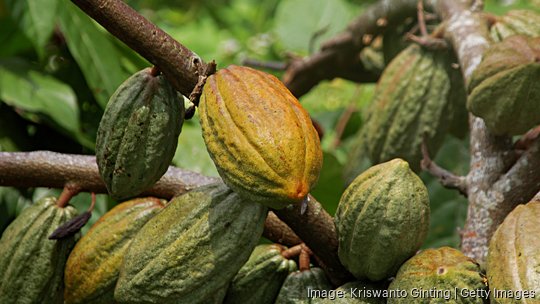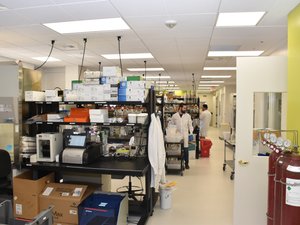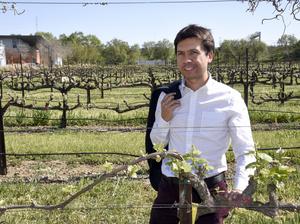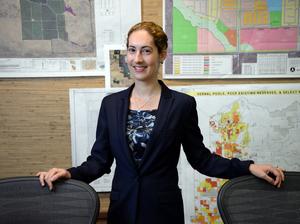
Mars Inc., the maker of M&Ms and Snickers candy bars, is developing traits and programs in Davis to help the cocoa plant survive on a more dangerous planet.
From rapid prototyping, gene mapping and even field assistance map apps, Mars researchers are working in Davis greenhouses and labs to save the species that is the source of chocolate.
"Cocoa could be extinct by 2050," said Amanda Davies, chief procurement and sustainability officer with Mars Wrigley, the snacks and treats division of Mars.
The loss of cocoa would be sad, she said, but it also would affect the livelihoods of 50 million people around the world who are involved in growing and processing the fruit.
Some 140,000 of those people whose livelihood depends on cocoa work at Mars.
Mars brands, many of which are chocolate, account for $11 billion in revenue, so saving the plant is a priority for the private, family-owned company, said Chris Rowe, global vice president of research and development at Mars Wrigley.
Climate change, disease and pests are real and growing threats to cocoa, which is a fragile plant, Rowe said. In some growing regions, up to 50% of the crop is lost to pest and disease.
"This crop has got challenges," Rowe said.
That's why Mars has invested in research and greenhouses at the University of California Davis. In 2015, Mars began investing $40 million over a decade in development of cocoa programs with UC Davis. The new greenhouses on campus, completed in the spring of 2020, are part of that effort, said Joanna Hwu, senior director of cocoa plant science at Mars Wrigley.
Researchers and scientists at Davis are working on genetics and breeding programs, agronomy and integrated pest management specifically for cocoa. Mars operates 20,000 square feet of greenhouses on campus, and it has a genetics lab in downtown Davis. The local effort has 18 researchers and three students.
Mars has three groups of greenhouses at Davis. One is a conservation location for live cocoa trees. Chocolate seeds are a living plant, and they cannot be stored in a seed vault. Cocoa seeds don't store, they die, Hwu said. The conservation greenhouse has nine of 11 groups of cocoa major strains representing 80% of the plant's genetic diversity.
The second greenhouse is used for characterization, where researchers seek out specific traits, such as drought tolerance, and then isolate those plants. A third greenhouse is dedicated to accelerated breeding to produce plants that have better disease resistance, higher yield and stress resistance.
Unlike corn, rice and wheat, whose genes have been studied for years by thousands of people, cocoa is an orphan plant with very little study by academics.
Mars opened a cocoa research center in Brazil in 1982 to study the plant. The company began work on sustainability and protection of the crop in 1990.
Mars worked to sequence the cocoa genome with IBM (NYSE: IBM) in 2010, and then it shared the genome publicly, Davies said. Mars in 2018 committed itself to a Cocoa for Generations project, which is a 10-year and $1 billion effort to sustain cocoa.
"The world we want tomorrow starts with the work we do today," she said.
Mars has even developed apps to support its growers in the field. An app Mars developed uses an algorithm to test the cocoa grove, which is usually planted with 1,200 trees per hectare. The app shows the farmer where to go through the grove to hit specific geographic areas whereby scouting just 0.5% of the farm, the app can monitor the health of the entire grove. On a well-managed farm, losses can reach 20% of the field. With the geo-tracked app monitoring the field, farmers can cut their loss to 5%, said Jean-Philippe Marelli, a Mars researcher in Davis.
Cocoa cultivation occurs in a narrow band within 20 degrees of the equator, with Central and South America, West Africa, India and Indonesia being top-growing regions. The beans are harvested, fermented and dried by the farmers.
McLean, Virginia-based Mars operates in more than 80 countries. Along with candy brands that include Twix, Juicy Fruit gum and Life Savers, the company makes food products such as Ben's Original rice and pet food brands including Iams, Pedigree, Crave and Whiskas.









